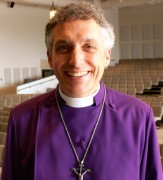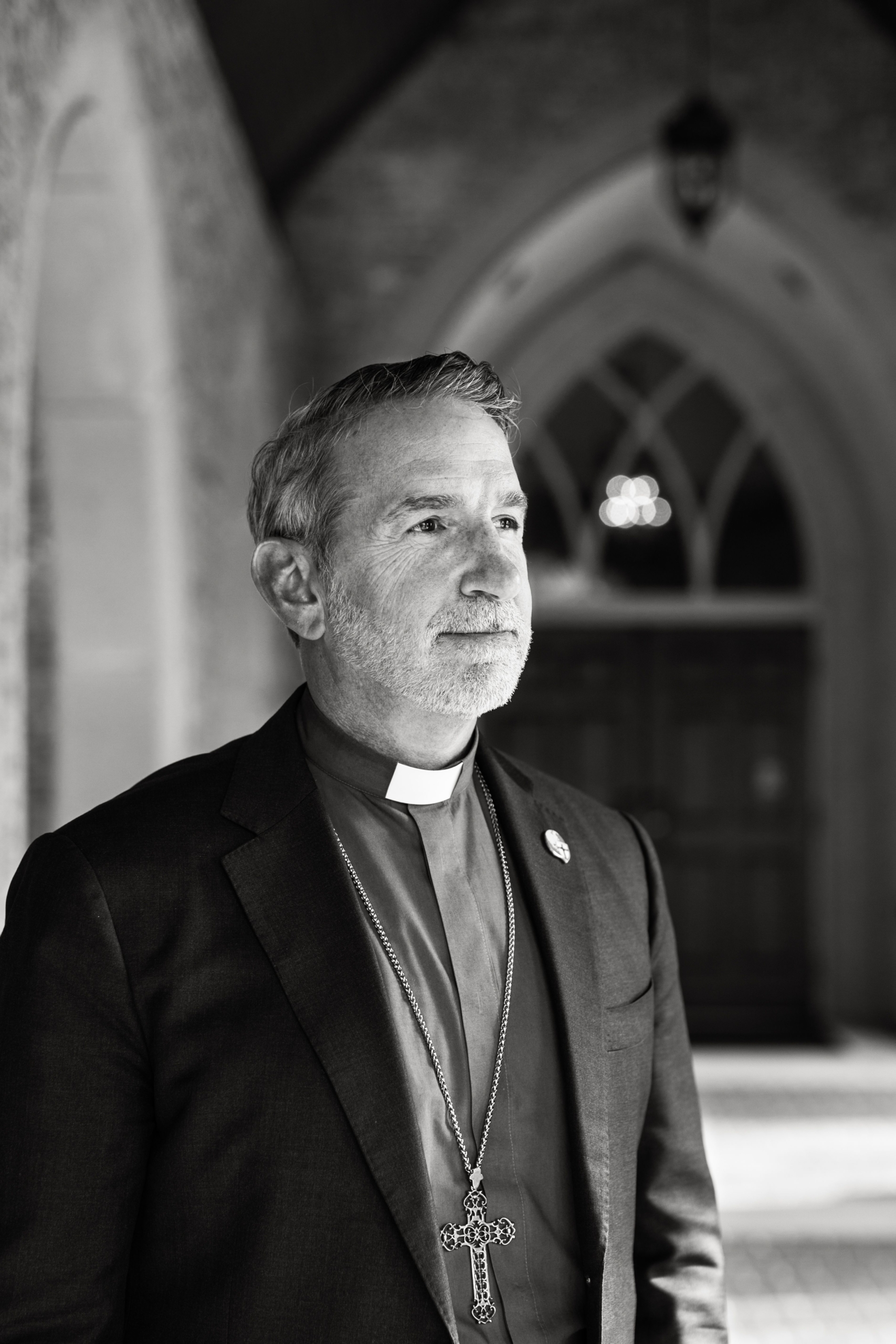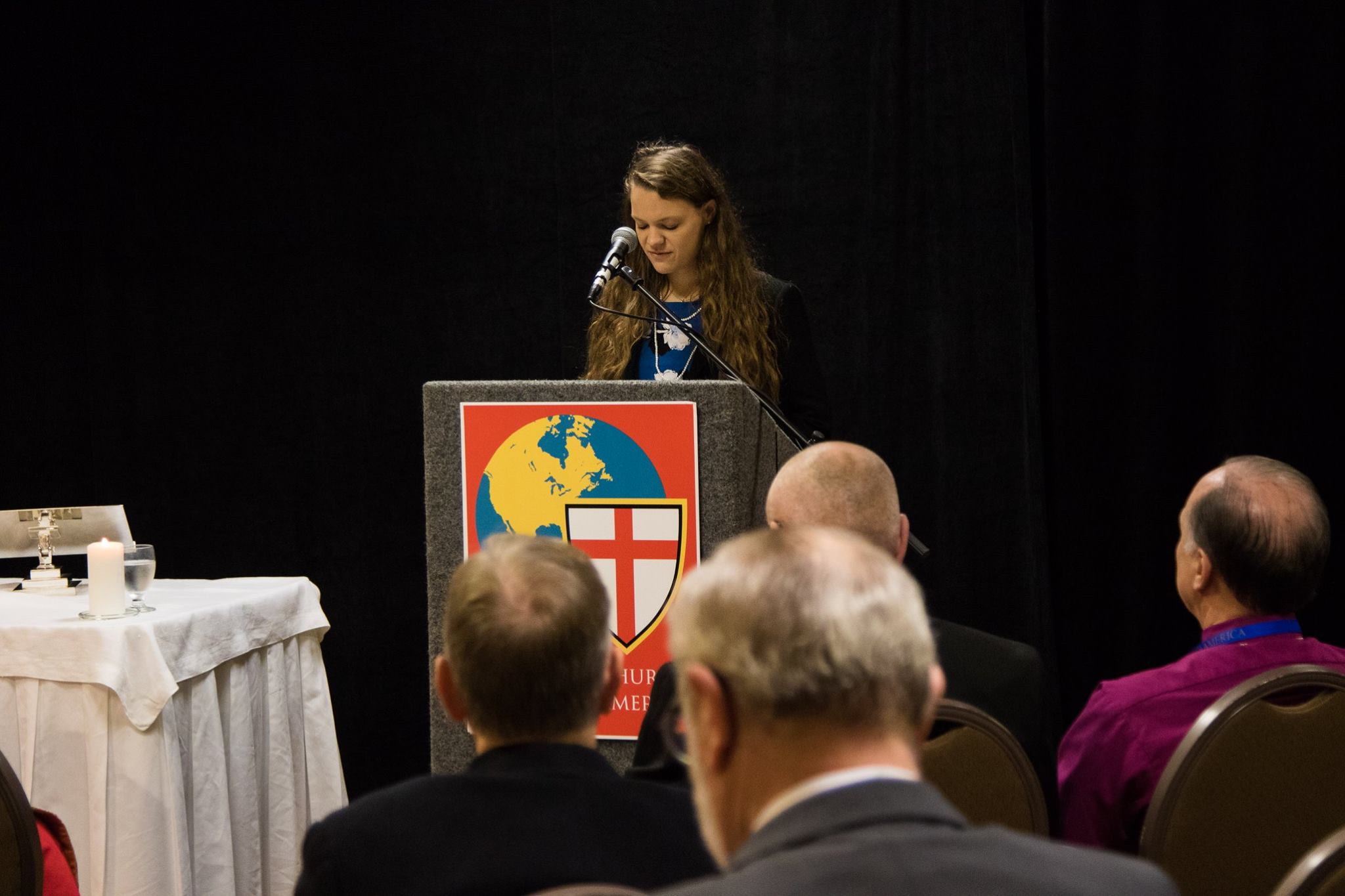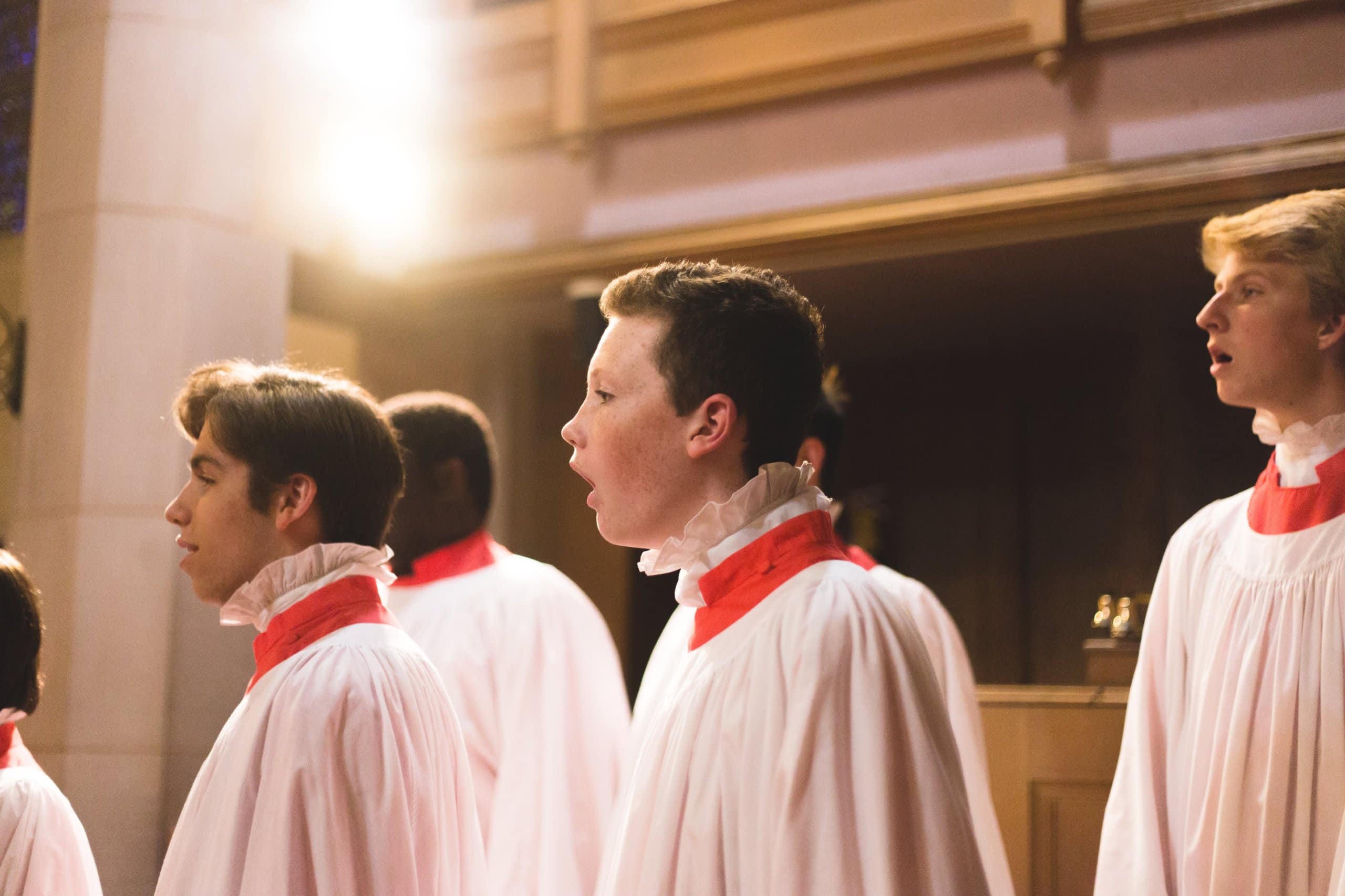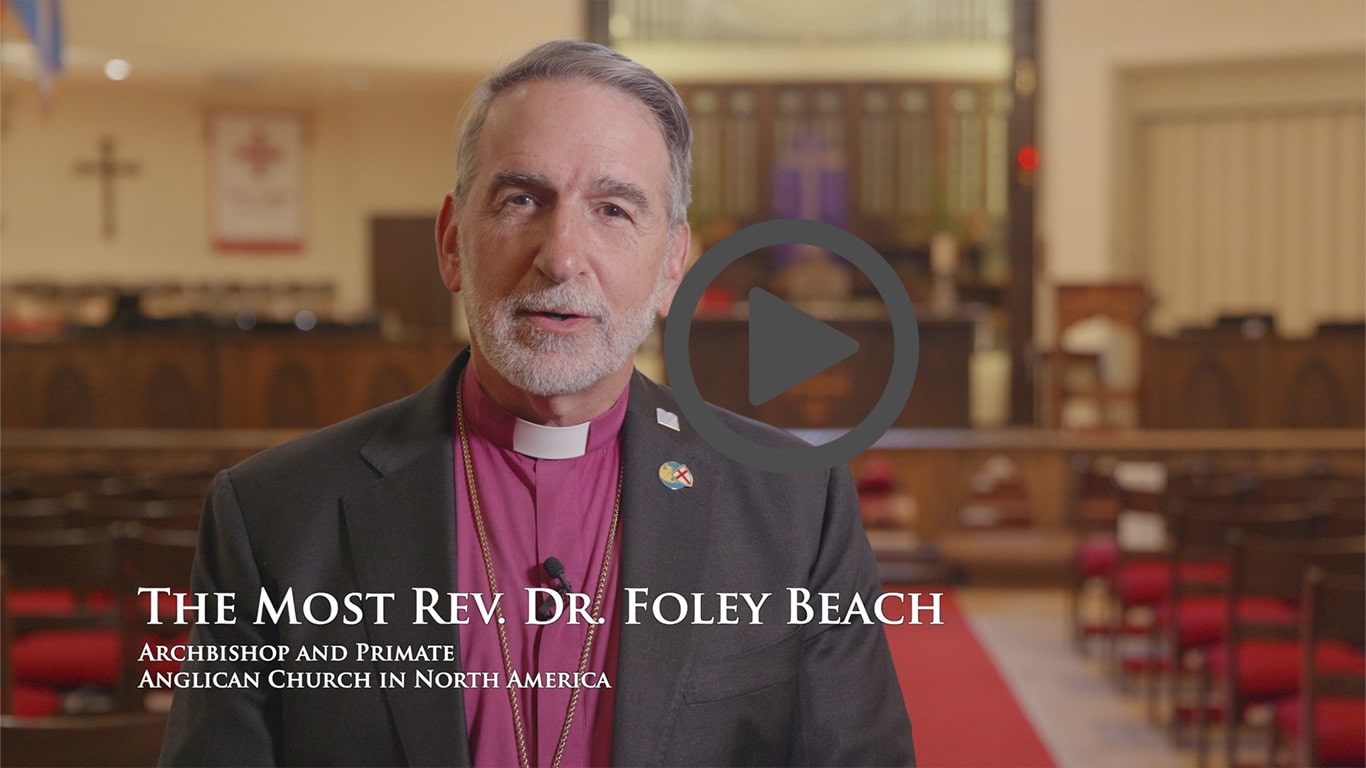The Rt. Rev. Stewart E. Ruch III was consecrated the first bishop of the Diocese of the Upper Midwest in the Anglican Church in North America on September 28, 2013. He is the rector of the Church of the Resurrection (Wheaton, IL), where he has served since 1999. He completed his Masters in Theology at Wheaton College Graduate School where he was awarded the Kenneth Kantzer Prize for theology. He is currently working on the completion of his Doctor of Ministry from Nashotah House Theological Seminary, Nashotah, WI.
Bishop Ruch and his wife Katherine have six children. He loves running, reading novels, biographies, and leadership books, and spending as much time as possible exploring forests and streams with his children.
How did you become a Christian believer?
I was raised by parents who knew the Lord and in the Charismatic Movement of the 1970s, I came to a strong and living faith. In my college years, though, I had a very intense spiritual struggle. My parents divorced, and I found myself spiritually and emotionally confused. That season of confusion became four years of spiritual darkness in which I walked apart from Christ.
In September 1991, through the ministry of Church of the Resurrection and Fr. William Beasley, I made a radical return to the Lord and to His church.
What brought you to the “Canterbury Trail” – the Anglican Church?
I was raised in a high church Presbyterian tradition where liturgy and vestments were a part of our worship service. And I would visit my grandparents’ Episcopal Church from time to time.
But I first fell in love with the Anglican Church my freshman year at Wheaton College when I discovered the Book of Common Prayer and St. Marks Episcopal Church in Geneva, IL. I was literally so excited about going to church that I could hardly sleep on some Saturday nights. The compelling mixture of biblical preaching, poetic prayer and liturgical beauty drew me in to the Anglican way with great power.
How do you envision your role as a bishop in the Anglican Church?
On my consecration weekend, I shared with our new diocese that there are a few things I will be focusing on. To communicate this I used the acronym “F.E.U.”
My first priority is to be a Father in Christ to the people in our diocese, to our church planters, and to our clergy. I see this father role being especially expressed in the ministry of preaching, in coaching leaders and in sacramental ministry.
Second, my priority is to be an Evangelist. It is my goal to always be involved in personal evangelism in building friendships with those who are far from God as well as regular Gospel preaching through Church of the Resurrection’s Alpha ministry and Sunday morning Parish Missions. I also have a growing passion to share the good news with the marginalized and the increasing number of people caught in poverty in our local community.
Finally, as a bishop I seek to be a Unifier within God’s One Holy Catholic and Apostolic Church. I have a passion for unity among biblical Anglicans. I have a passion between Christian brothers and sisters where relational reconciliation is needed. I have a passion for unity among biblical Christians here in the Wheaton area. I also feel a great responsibility to live in fidelity and unity with the bishops throughout history.
How many churches are currently in your diocese?
Approximately 30.
What are the priorities in your diocese?
On the consecration weekend I also called our diocese to focus on a “F.E.U.”
The first priority is that everyone within the diocese is building their Friendship with God. The most powerful strategy for growth is for every believer in our diocese to be growing in God’s Word, listening to God’s Spirit and going out from holy church on mission.
The second priority is for all the people in the diocese to be involved in Evangelism through personal friendship, parish outreach, and, especially, church planting.
The third priority is the call to Undying prayer. Before I was consecrated, I had the joy of doing a prayer tour of the Upper Midwest where I met and gathered with our deaneries in four different prayer meetings to call out to God on behalf of our diocese and our work of mission.
How do you envision church planting in the Diocese of the Upper Midwest?
The first priority in church planting is to create a highly relational and highly strategic training process for lay and ordained leaders in every deanery of our diocese. I have a passion to see leaders and artists trained in the Word, leadership and creativity for the purpose of strengthening existing churches and starting new ones.
This follows the strategy that I’ve been able to observe in the global south where their leaders put a great emphasis on men and women being trained within the diocese to church plant and church build.
Every parish is also encouraged to focus resources and leaders on the work of church planting. As a matter of fact we’ve given every parish the opportunity to invest up to ½ of their 10% tithe to the diocese in the work of church planting and the work of mission within their local sphere of influence.
I am continually trying to build a culture where people and parishes are empowered to plant churches. It is my hope that over the next two decades we will see hundreds of churches planted. I think it’s possible—very possible.
What excites you most about your ministry?
Everything – I love it all. My great ministry passion is leadership — especially the raising up of leaders and the building up of new leadership cultures. I also love the ministry of preaching, evangelism and the life of prayer.
How do you balance your family life with your calling as a bishop?
Early on as an Intervarsity staff worker, I made the decision to set aside two days a week for family. This helped me flesh out my goal that my family is my first church and over the last 20 years I’ve been able to maintain that priority.
The main way I’m able to create this balance is that I am naturally driven to do so because I love being with Katherine and my children – it’s not simply a chosen priority because it’s my first passion.
What is the name of a book you are reading right now? What do you like about it?
There are two books I’m really enjoying right now. The first book is by Fr. John Behr, Becoming Human. I’m also really enjoying Harvard Business School professor John Kotter’s On What Leaders Really Do. I’m always reading a book on theology, on leadership and a novel. I also love poetry.
What do you see as a major challenge facing Christians today? How do you see Anglican Christians making a difference in that challenge?
I think the three great concerns of our day, in this order, have to do with the culture of life (especially as it relates to the unborn), the culture of marriage and the culture of serving and ennobling the poor.
I’m convinced that the greatest way to address these challenges is to strengthen existing churches and to plant new churches. There is no greater hope for our country and the world than Jesus and His Holy Church. As Christians seek to build the culture of life, vibrant marriage, and love for the unseen and the marginalized the most powerful and transformative way to do so will be through the church.
What has being a husband and father taught you?
Being a husband and a father has had a profound impact on me as one seeking to imitate of Christ. Being a husband and father has taught me how to love. It has taught me how to die to self. It has taught me that in the power of the Holy Spirit I have more strength and more stamina to serve others and to love others than I ever thought I was capable of.
How may we pray for you?
Pray that I will be a Holy Spirit anointed father to my family, my parish, and my Diocese. Pray that I will have the courage to die to self and be full of Jesus.
